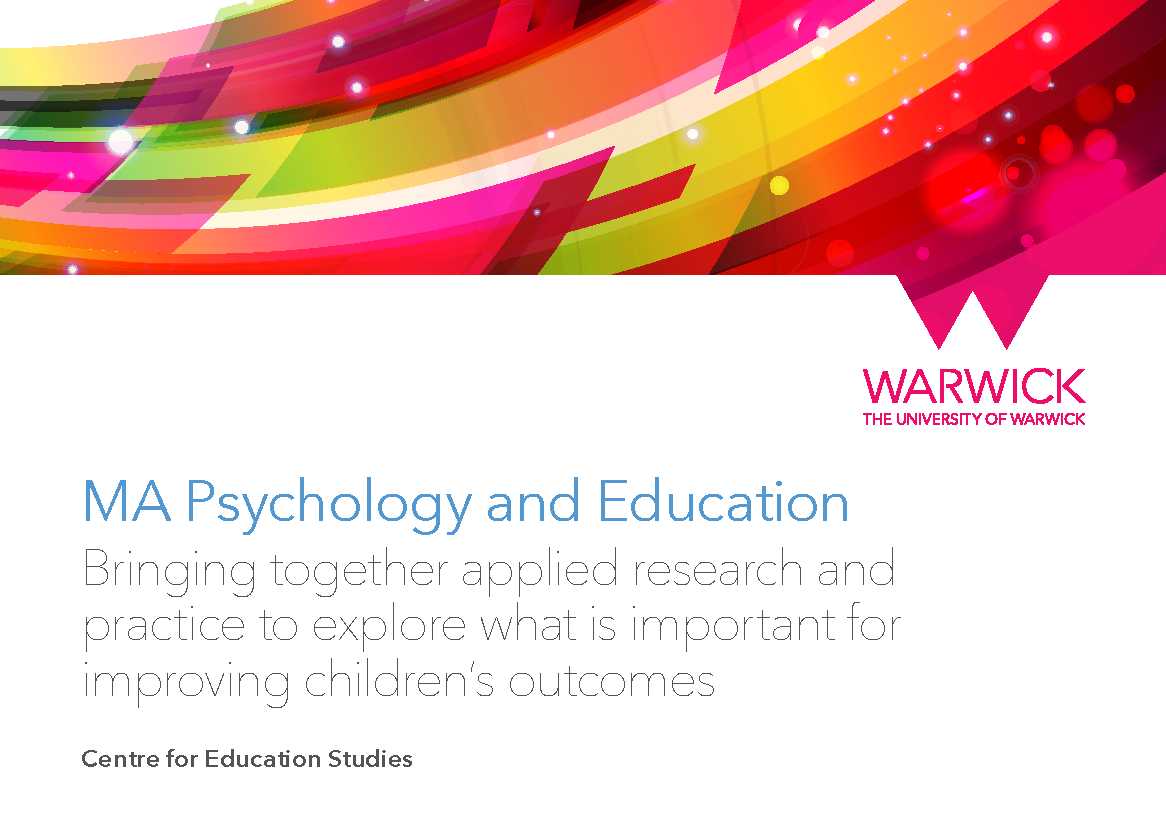MA Psychology and Education (C8X3)
"Psychology is a science and teaching is an art: and sciences never generate arts directly out of themselves" James, 1899
About the Course
Psychology has an important role to play in understanding how children and young people think, learn, feel and behave in various contexts, including family, school and the community. Through this course, we explore how psychology and education come together to improve children’s life chances. This course is ideal for you if your interest lies at the interface of applied psychological research and real-world applications in educational contexts. We focus on evidence based practice both from the point of view of building the evidence base through research, but also from an applied perspective e.g., learning and practising behavioural skills that are core components of evidence-based approaches.
Please note, successful completion of this programme will not make you eligible for the GBC. Find out more
- Please note that if you wish to study on a part time basis, all modules are taught during the normal working day and there is no distance learning or out of hours provision. The aim will be to limit teaching on the course (as much as possible) to two days a week - if this is a consideration for you please contact us prior to applying so that we can advise you further.
- Please note that if you wish to study on a part time basis and apply for a student loan, to fulfill the requirements of the Student Loan Comany you will need to complete the course in a maximum of two years - if this is the case please apply for C8X4 MA Psychology and Education (this is taught alongside C8X3 but has a shorter timescale so meets the requirements for a part time student loan).
Suitable for
Whether your background is in psychology, education, social sciences or a related discipline, and whether you are a student or currently working as a practitioner, educationalist or in the voluntary sector, this course is designed to provide you with the latest evidence from applied research. It focuses on what works for improving children’s academic, emotional, behavioural and social outcomes, how evidence for practice is generated, and the current state of play in early intervention for children at risk or children with special education needs.
All PGT students in the for Education Studies are required to complete 180 credits at M Level; part-time students may be considered for Accredited Prior Learning.
Course aims and benefits
This course will help you to develop the skills to understand and communicate psychological research (such as that in early intervention, or special educational needs and disabilities) and its implications for education, whether in school or the wider social context of children and their families. You will have the opportunity to discuss with your peers questions such as:
- In what ways early intervention improves the life chances of children?
- What role do individual differences (e.g., emotions, personality and intelligence) play in children’s learning?
- How is evidence generated and what is evidence-based practice?
- How do contextual factors work together to shape children’s developmental outcomes?
The course is research-led. Students will have opportunities to engage with current research that the MA team and collaborators are conducting, especially in the areas of intellectual disabilities and autism.
Course structure
You will complete a core module in Research Methods in Psychology and Education (30 CATS), plus three innovative interdisciplinary modules which have been co-created between Education Studies and the Centre for Educational Development, Appraisal and Research (CEDAR).
The modules will be partly taught by members of these departments, all of who are active researchers, as well as guest lecturers who are researchers and practitioners, thus giving you access to a wealth of research and knowledge on issues around psychology and education from a variety of standpoints.
| Research Methods in Psychology and Education (30 CATS) |
| Early Intervention (30 CATS) |
| Special Educational Needs and Evidence-Based Practices (30 CATS) |
| Dissertation MA Psychology and Education (60 CATS) |
|
Plus 1 optional module.See from our list currently available modules |
You will also complete a dissertation under the supervision of a member of our well-published academic staff (60 CATS).You will be offered opportunities to conduct real-world research for your dissertation by joining existing larger projects or through our collaborations with special schools in the area. Our key areas of research currently are:
- Interventions to improve academic outcomes (e.g., reading, maths, handwriting) in special education
- Intellectual disabilities across the life span
- Autism spectrum disorders across the life span
- Behaviour problems and mental health of children with developmental disabilities
- Contextual influences on children’s behaviour problems
- Early intervention
Got a question?
Contact the Course Leader, Olympia Palikara Olympia dot Palikara at warwick dot ac dot uk
Contact the Course Leader
Dr Dimitra Hartas
Key Facts
Course duration
- 1 year full-time; 2-3 years part-time
Study programme
- 3 core modules
- 1 optional module
- Dissertation
Assessment
- 4 assignments of 5,000 words each (or equivalent)
- Dissertation
Entry requirements


